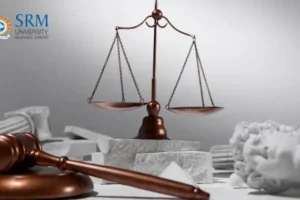
Private Law Colleges in Delhi NCR 2025-26
Introduction
Politics and law often collide in India, especially when elected leaders face criminal charges and even get arrested while holding a top position. It creates a lot of confusion among citizens:
- Can a minister stay in power after an arrest?
- Does the law force them to resign immediately?
- Or can they continue until the final court judgment?
In 2025, the government proposed the 130th Constitution Amendment Bill. It aims to remove ministers, like the Prime Minister and Chief Ministers, if they have serious criminal charges. This can happen even before a conviction. The bill has sparked debates in the Parliament. Political parties are discussing their scope and how it should be implemented.
For LLB aspirants and students who plan to join private law colleges in Delhi NCR, this is not just a current affairs headline. It is a real-world situation focusing on constitutional law, criminal law, ethics, and public policy.
This blog covers what happens when a minister is arrested and convicted. You do not need to have a legal background to understand it. By the end, you will know the process clearly and why it is important for law students.
Upcoming Legal Changes: 130th Constitutional Amendment Bill
In 2025, the government came up with the 130th Constitutional Amendment Bill, which can remove ministers who face serious criminal charges, even before conviction. Currently, more than 70 MPs and MLAs in India face pending criminal cases, which highlights why such a law is being considered.
If passed, over 10% of the sitting legislators can be affected by this bill. The bill was sent to a parliamentary joint committee, but parties like TMC, SP, and AAP are boycotting it. Passing a constitutional amendment needs a two-thirds majority in both houses, so it is not easy.
If the bill passes, ministers could be removed immediately upon facing serious charges, instead of waiting for a conviction. For LLB students, this shows how law, politics and governance change, and how reforms can directly affect political careers.
The Legal Framework Governing Ministers in India
India is governed by a written Constitution and supporting laws like the Representation of the People Act, 1951 (RPA). Together, they define the eligibility, disqualifications, and the removal process for elected representatives like ministers.
Here are the main provisions that you should be aware of:
Article 164 (B) – Constitutional rule
This article says: A person who is disqualified as a legislator cannot hold the position of minister in the central or state government.
So, if someone loses their seat in the legislature, they automatically lose their ministerial position.
Representation of the People Act, 1951 – Section 8
This law deals with disqualifications because of criminal convictions.
- If an elected representative is convicted of certain offences for a minimum of two years or more, they will lose their seat immediately. Since 2010, at least 15 MPs and MLAs have lost their seats immediately due to convictions under RPA section 8.
- This is applicable for MLAs, MPs, and ministers, as the minister should be an MLA, MP, or a member of the legislature within six months.
Presumption of Innocence
Indian law follows the principle that a person is innocent until they have been proven guilty. A 2023 survey found that 83% of the citizens believe that ministers should resign immediately after arrest, even before conviction.
- Mere arrest does not mean guilt.
- So, arrest alone does not automatically disqualify a minister
- Only a conviction by a court results in legal disqualification
Arrest vs. Conviction – The Key Difference
Many people confuse arrest with conviction, but legally, they are very different. Let us break it down:
| STAGE | MEANING | EFFECT ON THE MINISTER’S POSITION |
| ARREST | The minister is taken into police custody during the investigation | They can continue in office unless they resign voluntarily or are asked to step down by the PM, CM, or the party |
| CONVICTION | The court finds the minister guilty after the trial | They must leave office immediately if the sentence is 2 years or more, under RPA section 8 |
| APPEAL PROCESS | Minister challenges the conviction in a higher court | If the higher court stays the conviction, the minister might return to the office |
Connection to the Bill
The proposed 130th Constitutional Amendment Bill can change this flow. Ministers might have to leave office immediately after facing serious criminal charges. This alters the traditional arrest > conviction > appeal sequence.
So, in simple words:
- An arrest does not mean automatic removal.
- Conviction is a mandatory approval.
This is why some ministers stay in power even after arrest – because legally, they are still considered to be innocent until conviction.
Real-Life Cases Where Law and Politics Collided
Law and politics often collide, which directly affects people who are in power. Convictions, acquittals and legal proceedings can change political careers overnight. Some of the real-world cases focus on this clearly:
Lalu Prasad Yadav (2013) – Fodder Scam Case
- He was the railway minister and a senior political leader
- After the conviction in the fodder scam, he lost the MP seat immediately under the RPA Act.
- This case showed that once a conviction happens, the law leaves no room for discretion.
Jayalalithaa (2014) – Tamil Nadu CM
- She was convicted in a disproportionate assets case and had to resign from the position of Chief Minister.
- When the higher court later acquitted her, she returned as the chief minister.
- This shows the role of the appeal process in political careers.
Hemant Soren (2024) – Jharkhand CM
- He was arrested but continued as the chief minister until legal proceedings progressed further.
- This case shows that arrest alone does not remove a minister from power.
Ethical and Political Debates
Even though the law allows ministers to continue after arrest until conviction, ethical questions are:
- Should ministers resign after an arrest to maintain public trust?
- Do we need strict rules for ministers who face serious charges like corruption and violence?
- Does keeping arrested ministers in power weaken democracy and set a bad reputation?
For LLB students, these debates are important as law is not just about rules. It is more about ethics, governance, and public trust.
Why This Topic Matters for LLB Aspirants
If you wish to join top private law colleges in Delhi NCR or dream of having a legal career, understanding topics like this is beneficial:
- How the law is used in real-life political situations
- Difference between arrest, bail, conviction and appeal
- How the law affects democracy and ethics in politics
- Judicial service and civil services exams are one of the topics that often appear in interviews and essays.
For moot courts and debates, this is a hot topic as it focuses on law, politics and ethics in one case study.
The Role of Law Colleges in Teaching Real-Life Cases
Top law colleges in Delhi NCR make sure that students are aware of the landmark cases, attend moot courts and learn via legal clinics.
In Delhi, SRM University Delhi NCR Sonepat is one of the private law colleges in Delhi.
Comprehensive Law Programmes
- BA LLB, BBA LLB, and LLB courses cover constitutional, criminal, and corporate law.
- Special electives on public policy, AI, and Law and ethics in governance.
Affordable Fees and Scholarships
- When compared to many private law colleges in Delhi NCR, SRM University Delhi NCR Sonepat offers affordable fee structures.
- Scholarships for meritorious students reduce the financial burden
Practical learning
- Moot court competitions, legal help clinics, internships with top law firms
- Case studies like “Ministries and Arrest Laws” are for hands-on learning.
Strong placements and global exposure
- Graduates can easily work in law firms, corporate companies, NGOs, and even international organisations.
- Collaborations with foreign universities to offer global learning opportunities.
Career Options After LLB
After studying at top law colleges in Delhi, students can explore the following careers:
- Litigation and the judiciary to become a lawyer or judge
- Corporate law firms to handle contracts, mergers, and compliance
- Policy research and governance for working with think tanks and NGOs.
- International law and human rights if students wish to work with global organisations like the UN.
FAQs for Law Aspirants
Can I pursue LLB after 12th at SRM University, Delhi NCR, Sonepat?
The law colleges in Delhi with low fees offer BA LLB and BBA LLB for 12th pass students and LLB for graduates.
What are the fees for private law colleges in Delhi NCR?
SRM University Delhi NCR Sonepat provides students with an affordable fee structure with scholarships.
Do students study real political cases in law colleges?
Absolutely. Cases like Lalu Yadav, Jayalalithaa, and Hemant Soren are discussed in detail.
Is SRMUH among the private law colleges in Delhi?
Yes. SRMUH ranks among the private law colleges in Delhi private in the region with modern course modules, moot courts, and placements.
Step-by-Step Flow of What Happens After an Arrest
Here is a simple flow to remember:
- The minister gets arrested, and the investigation continues. The minister can stay in office unless the CM or PM removes themselves by their own choice.
- Trial happens. There would be immediate disqualification if found guilty of more than 2 years of punishment
- If the higher court stays the conviction, the minister can return to power.
Final Takeaways for LLB Students
A few key lessons stand out while studying these issues:
- An arrest does not disqualify a minister.
- There should be a mandatory disqualification if the sentence is more than 2 years.
- Public pressure may force resignation before the law requires it.
- The real-world case studies help students to understand how law and politics intersect with each other.
If you are preparing for LLB or planning to join private law colleges in Delhi NCR, knowing these details helps you connect classroom learning to real-world governance.
Source link




